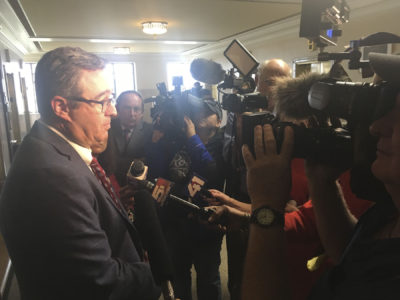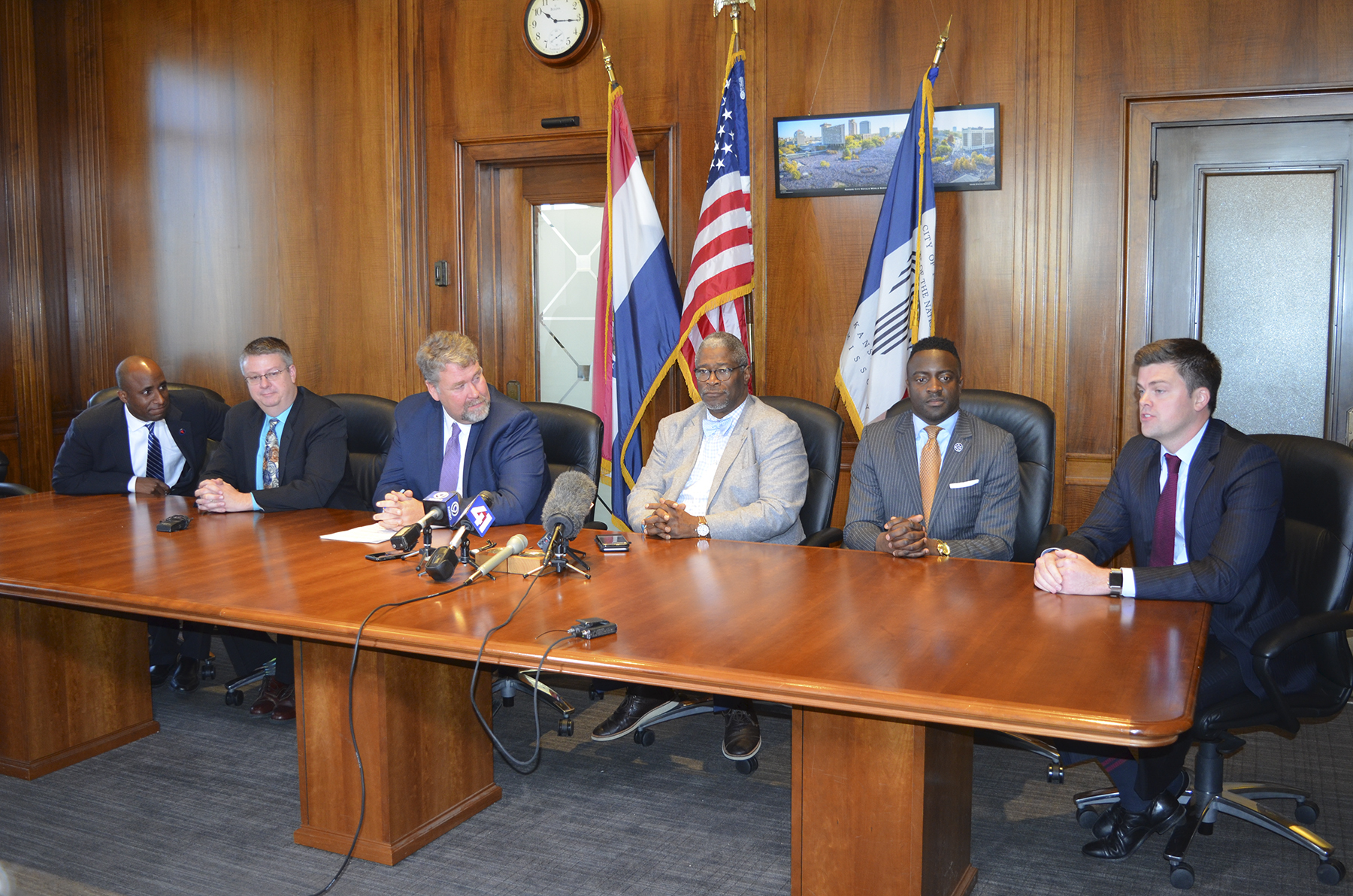 By Paul Thompson
By Paul Thompson
Northeast News
Edgemoor’s grasp on Kansas City’s single terminal airport project hangs in the balance.
On Thursday, December 14 – two weeks after the release of a Memorandum of Understanding (MOU) between the City and Edgemoor Infrastructure and Real Estate for the construction a new single terminal airport – the MOU was summarily rejected by a nine member super-majority of the Kansas City, Missouri City Council.
But the Council didn’t just reject the MOU; 5th District Councilman Lee Barnes proposed an ordinance to terminate all ongoing talks with the firm tapped to construct the more than billion-dollar single terminal at Kansas City International Airport. Over calls from some Council members for Barnes’s Resolution No. 171017 to be discussed by the full body, Mayor Sly James assigned the legislation to a vital gathering of the City’s Airport Committee at 9:30 a.m. on Thursday, December 21.
Meanwhile, sensing a window of opportunity, AECOM’s KCI Partnership team held a press conference on the morning of Monday, December 18 to express its “unwavering commitment to design, build, and finance a new single-terminal at KCI and announce new team partners.” By the time of the announcement, the big reveal was already a poorly-kept secret: AECOM and Burns & McDonnell would be teaming up on a bid to wrestle the KCI project from Edgemoor’s tenuous grasp.
With the frenzied pace of new developments, it’s unclear exactly how the City will proceed from here. Remember, Council members Jolie Justus (4th District), Jermaine Reed (3rd District), Katheryn Shields (4th District) and Mayor James voted to approve the MOU on December 14. Second District Councilman Dan Fowler has publicly stated his preferred path forward: to negotiate in good faith with Edgemoor to iron out issues within the MOU.
Barnes, however, has remained resolute in his opposition to Edgemoor since the moment the Procurement Selection Committee identified the developer as the preferred candidate for the project.
“I said back then that I thought they were making a mistake,” Barnes reiterated on December 15.
The motivations of the other eight ‘no’ votes are disparate, though some key issues with the MOU have surfaced since its November 30 release. Multiple Council members have questioned the size and scope of the Community Benefits Agreement (CBA), valued at around $10 million, along with the fact that it would be funded through airport revenues. That funding mechanism means that the CBA must be approved by the Federal Aviation Administration (FAA), a necessity which lends uncertainty to the final benefits package.
What’s more, a clause of the MOU calls for Edgemoor to receive a $30 million reimbursement if negotiations break down between the approval of the MOU and financial closing of the deal. Those issues, combined with a document that has been described as “vague” by some Council members, have left Edgemoor on the brink of being jettisoned from the project.
While the decision to reject the MOU appeared shocking on the surface, it was in some ways a natural progression for a Council that has expressed serious reservations about the MOU since its release.
Sixth District Councilman Scott Taylor struck a non-committal tone as early as Friday, December 1, when he offered his initial thoughts on the document during an interview with the Northeast News. Taylor, who along with Barnes voted against the Edgemoor recommendation in an 10-2 Council vote in September, indicated that the developer still hadn’t done enough to secure his support.
“One of the things I raised is, I really think this needs to be a transformative project,” Taylor said.
Taylor also cautioned that the City would be relinquishing significant leverage once it approved the MOU. He stressed the need for more robust commitments to minority and women-owned business participation and a strengthened community benefits package – suggesting that Edgemoor should guarantee those benefits, whether or not the Federal Aviation Administration (FAA) approves the proposal.
“What I’d like to see is a commitment by that company that they will indeed fund this regardless of whether the FAA approves the way it’s set up now,” Taylor said.
Still, when Edgemoor hosted a KCI Community Design Workshop at Gregg/Klice Community Center on Tuesday, December 5, Councilman Reed expressed optimism that the MOU would be approved before 2018.
“Edgemoor has shown themselves to operate in good faith,” Reed said. “I think it will be an early Christmas gift.”
The December 7 meeting of the Airport Committee, though, provided another sign of trouble for Edgemoor. During that meeting, Barnes offered public testimony that advocated for more direct funding of the community benefits.
“I simply say, we just need Edgemoor to write checks to these funds. If those things are done prior to us having an airport agreement, I don’t think the FAA would have any concern,” Barnes said. “So I don’t think there’s much concern about how we do these community benefits, unless we’re trying to use airport revenues to get that done.”
In the same meeting, 3rd District Councilman Quinton Lucas stated dissatisfaction with the fact that the regional flying public would bear the financial burden of the community benefits proposed under the MOU.
“Maybe others will see it a different way, but it seems as if the way that they’re structuring this deal, the money is coming from airport revenue,” Lucas said.
Despite these concerns, Reed and Lucas surprised Airport Committee chair Justus by bucking her plan to keep the MOU ordinance in the committee for two weeks. Instead, the two collaborated on a motion to push the ordinance forward to the full Council on December 14, rather than keeping it in committee for a second week of discussion. Justus went along with the motion, which passed unanimously, but she cautioned afterwards that the decision had the potential to create problems.
“Here’s what we can’t do: we can’t get into a situation where the Council makes changes to the MOU or the ordinance that we vote on immediately without going back to the airlines and the developer to make sure they have agreed to those things,” Justus said.
As it turned out, by December 14 nine members of the Council had seen enough of the MOU to determine that it wasn’t in the best interests of the City. After the rejection of the document, Reed went into damage control mode.
“Despite what has occurred today, I am redoubling my efforts starting tonight to work hard to ensure that progress and forward motion on this development will continue,” Reed said in a statement following the vote. “We will not stop. We will not give up.”
Other City leaders flocked to social media to explain the rationale behind their actions. Sometime after 10 p.m. on December 14, 1st District Councilman and Mayor Pro Tem Scott Wagner defended his “no” vote on the MOU as an exercise in fiscal responsibility.
“You tell me, if I have concerns about a variety of issues is my position better before or after I agree to pay up to $30 million?” Wagner asked rhetorically. “Would you prefer for me to have problems with training, MBE/WBE %, finance, transportation, local workforce development, labor issues or anything else before or after I agree to pay up to $30 million three months from now?”
Wagner went on to relay a conversation with a representative from an airport already in business with Edgemoor, who suggested that the developer was “18 months behind schedule and over budget” on their project. Wagner further stated that his research revealed that Denver’s $1.8 billion airport expansion comes with a $9 million reimbursement agreement, $21 million less than what Edgemoor has proposed for Kansas City’s terminal modernization project.
Wagner elaborated on his decision during a December 15 conversation with the Northeast News, stating his belief that three City initiatives identified for funding through the CBA – the Shared Success Fund (for East Side redevelopment), Love Thy Neighbor program (for home repairs in economically distressed areas), and general historic preservation efforts – wouldn’t pass muster with the FAA as an appropriate use of airport revenue.
“My read would be, there is no way that those are going to be seen as suitable uses of airport revenue,” Wagner said. “What I have looked at related to the FAA…my expectation is at the end of the day, there is not one penny of revenue generated at the airport that can be used for those three items.”
Wagner noted that procedurally, the Council now has three choices: 1) continue to negotiate with Edgemoor; 2) follow the procurement process and fulfill the obligation to move on to the second most qualified bidder, which the Procurement Selection Committee deemed to be the proposal led by Los Angeles-based AECOM; or 3) say no to entire process and start over.
Interestingly, Wagner wouldn’t rule out the potential re-emergence of Burns & McDonnell, despite the fact that the selection committee disqualified the hometown team’s proposal due to its financing structure.
“I think there’s always that hanging out there as a possibility,” Wagner said of the Kansas City-based developer.
During the Procurement Selection Committee process, Barnes took advantage of a Council push for transparency by sitting in on the proposer interviews. When asked whether he believed that the selection committee thoroughly vetted Edgemoor’s references prior to the final recommendation, Barnes didn’t mince words.
“No I don’t; I know they didn’t,” he said. “The Director of Aviation was supposed to report back to the selection committee on his contacts with some of the other airports. He came back and didn’t have any information.”
From the start, Barnes felt that both AECOM and Burns & McDonnell submitted superior bids to Edgemoor during the RFQ/P process. According to the 5th District Councilman, Burns & McDonnell included $10 million in community benefits in their proposal, and stated during its RFQ/P presentation they were willing to go as high as $15M. AECOM would have placed $5 million in a revolving loan fund that could escalate into $75 million over a multi-year term, while also including child care and transportation components.
After the failed MOU vote, Edgemoor promptly cancelled a community workshop scheduled for the evening of December 14 in Johnson County, Kansas. By December 15, however, the Edgemoor team began signaling their intent to re-enter the MOU negotiations.

“We welcome the opportunity to meet w/ Councilmembers to understand & address their concerns that first came to our attention last night. We remain committed to the project, & will continue to advance the vision for the new terminal that has been so well received by the community,” Edgemoor wrote in a pair or tweets. “Over the last several months, our team has been involved in active negotiations with the City and Aviation Department, and has engaged the community to gather critical insights with a focus on delivering a world-class gateway for Kansas City.”
The re-emergence of AECOM – along with the inclusion of Burns & McDonnell – further clouds the proceedings. On the morning of Monday, December 18, Reed released a new statement which clarified that the City was “not a part of any pending announcement” – an apparent reference to AECOM’s press conference. The statement also included new, stronger language aimed at his colleagues on the Council.
“A world-class KCI moves us all forward, and for my colleagues to engage in backroom political gamesmanship at the last minute to threaten the most generationally transformative infrastructure project in the City’s history, not only hurts our reputation as a business partner, but it also entirely violates the public trust that the citizens of Kansas City invested in us with their votes in November,” Reed said. “We have to do better as a City Council. Our voters and our business partners absolutely deserve better than what they got (on December 14) from the Council. The legacy of Kansas City deserves better than what these Councilmembers dished out.”
The language mirrored the exasperated tone of Mayor Sly James, who similarly chastised the Council in the December 15 memo that directed Barnes’s Resolution to the Airport Committee.
“Yesterday’s action halted a negotiation midstream and tossed it out the window with little warning,” wrote James. “That says to Kansas Citians that their will is less important than political agendas, and it sends a message to those who want to do business with Kansas City that we cannot be relied upon as a transparent partner.”
Despite Edgemoor’s interest in re-negotiating the terms of the MOU – and public rebukes from James and Reed – Barnes remained unconvinced that the developer can change his mind.
“It’s not going to happen,” Barnes said. “They’ve had plenty of opportunity.”


















